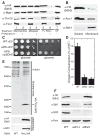SDH5, a gene required for flavination of succinate dehydrogenase, is mutated in paraganglioma
- PMID: 19628817
- PMCID: PMC3881419
- DOI: 10.1126/science.1175689
SDH5, a gene required for flavination of succinate dehydrogenase, is mutated in paraganglioma
Abstract
Mammalian mitochondria contain about 1100 proteins, nearly 300 of which are uncharacterized. Given the well-established role of mitochondrial defects in human disease, functional characterization of these proteins may shed new light on disease mechanisms. Starting with yeast as a model system, we investigated an uncharacterized but highly conserved mitochondrial protein (named here Sdh5). Both yeast and human Sdh5 interact with the catalytic subunit of the succinate dehydrogenase (SDH) complex, a component of both the electron transport chain and the tricarboxylic acid cycle. Sdh5 is required for SDH-dependent respiration and for Sdh1 flavination (incorporation of the flavin adenine dinucleotide cofactor). Germline loss-of-function mutations in the human SDH5 gene, located on chromosome 11q13.1, segregate with disease in a family with hereditary paraganglioma, a neuroendocrine tumor previously linked to mutations in genes encoding SDH subunits. Thus, a mitochondrial proteomics analysis in yeast has led to the discovery of a human tumor susceptibility gene.
Figures




References
Publication types
MeSH terms
Substances
Grants and funding
LinkOut - more resources
Full Text Sources
Other Literature Sources
Medical
Molecular Biology Databases
Miscellaneous

